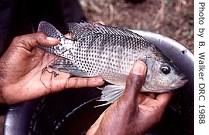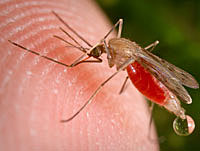2007年VOA标准英语-Researchers in Kenya Discover New Weapon Agains
搜索关注在线英语听力室公众号:tingroom,领取免费英语资料大礼包。
(单词翻译)
By Caroline SawyerNairobi
09 August 2007
In Kenya, environmental researchers say they may have discovered a new, effective weapon to combat malaria1. The disease kills more than 1 million people worldwide each year. Caroline Sawyer reports from our office in Nairobi that the weapon is a fish commonly found in Western Kenya.
 |
| Researchers hope the Nile Tilapia fish could help cut mosquito numbers in many areas of Africa plagued by Malaria |
These results are potentially life saving for local residents because malaria, which is spread through the bites of infected mosquitoes, kills more people here than any other disease.
According to the World Health Organization (WHO), approximately 40 percent of the world's population is at risk from the disease. In sub-Saharan Africa, malaria, which is caused by a parasite2, is responsible for over 3,000 deaths every day. The majority of victims are children under five years old.
 |
| Malaria is spread by mosquitoes |
"We were shocked to see how many malaria larvae6 were there and felt it was critical to reactivate those fish ponds," he noted7. "Of course, for that the ideal thing is to have a fish that is not only a good larvae eater, but also [the types] people like to eat, and the farmers can make an income [with]."
The number of people suffering from malaria has increased dramatically in the last 10 years. Scientists say this is partly due to the parasite's ability to become resistant8 to drugs, but they add that population movements and climate change also contribute to the rise. Researchers are working on a vaccine9, but progress has been slow.
The most effective way to prevent malaria is by sleeping under insecticide-treated bed nets, but many poor people in Sub-Saharan Africa cannot afford them.
Omlin's research on the Nile Tilapia published Thursday warns that this particular fish will not be able to help everyone.
"One has to operate with indigenous10 fish in order not to destroy or to affect the ecological11 balance in the environment," he explained. "One has to go local in a proper sense specific to find out which fish species are ideal and then make some very simple tests with that fish. Is that fish useful to the people? Do they like it for eating? Is it a good mosquito vacuum cleaner?"
Omlin says he hopes his work will encourage research on other indigenous fish that could help in other parts of the world. The United Nations estimates that malaria costs African countries $12 billion annually12.
 收听单词发音
收听单词发音 




